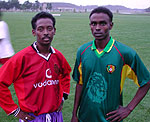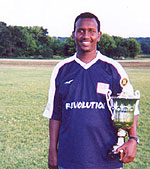By Rob Schmitz
Minnesota Public Radio
September 3, 2002
It can take many years to recover from the trauma of war. Some people may receive counseling or other therapy, while others find ways of helping themselves. Somalis in Rochester are finding help by playing soccer.
| |
|
|
|
||
Of the 30 men playing on the field behind the Rochester Community College, almost all are shouting. For Abdul Noor, it's a joyous sound. This is how Somalis play soccer.
Three years ago, Rochester didn't have a Somali soccer team. Noor worried about his friends who had turned to alcohol, drugs, and gangs. He knew the reasons why. Like many Somalis who arrived in the U.S. as refugees in the mid-1990s, he brought some heavy baggage with him.
Noor's heavy-set eyes are fixed on his fidgeting hands - an unconscious response to talking about painful memories from his country's civil war. He was just 11 years old when a group of Somali soldiers forced their way into his home and murdered his father in front of him.
"I was a little kid. And seeing all the disaster, people die in front of me. Seeing your dad or part of your family die in front of you, it was kind of tough," he says.
Noor considers himself lucky. He was spared, along with his mother, two brothers, and his sister. They came to the U.S. in 1994 after escaping through Kenya. He says his situation is typical for Rochester's growing Somali population.
| |
|
|
|
||
"You may see Somalis who have only one parent," says Noor. "A single mother who has five or six children, no father. A father who has two or three children, no mother."
Noor says missing parents, a new culture, and memories of war all contribute to drug and alcohol abuse as well as widespread depression among the Somali community. However, Noor has helped many find therapy in a black and white ball.
Three years ago, Noor, along with three friends, formed the Rochester United Soccer Club. The club's purpose was to give young Somali men a healthy alternative, and to help Rochester see the Somali community in a more positive light.
Abdul Ghedi lost many friends and family, including his mother, in the war. He was among the first to join the team.
"About 90 percent of these guys saw the war with their own eyes. They saw people getting killed right and left," says Ghedi.
Ghedi says sometimes he talks about the war with his teammates. But for the most part, soccer helps keep him focused on the here and now.
| |
|
|
|
||
"We do talk about it once in a while. But there's nothing we can do about it. Everybody's here. Everybody's trying to make a difference, trying to make a living. Some of us go to school full time, some of us are working," says Ghedi. "Some of us have families and stuff. Soccer is one thing that unites us. When I come here, I feel happy."
This team is more than just about making its players happy, though. The coaches want to be a positive force in the entire Somali community. Abdul Ghedi says the coaches have implemented a set of rules team members must follow, on and off the field.
"You can't do bad things. You can't smoke. You can't drink. As a soccer player you're a role model. There are little kids looking up to you," says Ghedi.
Simply using bad language is enough to get kicked off the team.
On the field, Rochester United has developed into one of Minnesota's best amateur soccer teams. It performs well in local leagues, and recently placed third in an international Somali soccer tournament in Toronto. Noor says Rochester United's games are now attended by both Somali and white residents. One of the team's biggest fans is the city's mayor.
Rochester United founder Abdul Noor says he hopes the team shows the community Somalis as they really are - people who have survived a civil war and who are looking ahead.
"We just want to prove to people that we (are) not a bad people - who use drugs and that who always thinking in negative ways," says Noor. "Most Somalis you see here, in United States, are survivors, all survivors."
This year, more than 100 young Somali survivors have already signed up for the team. As a result, next year, Rochester United will split up into two adult and two junior teams, bringing their roster up to 130.



